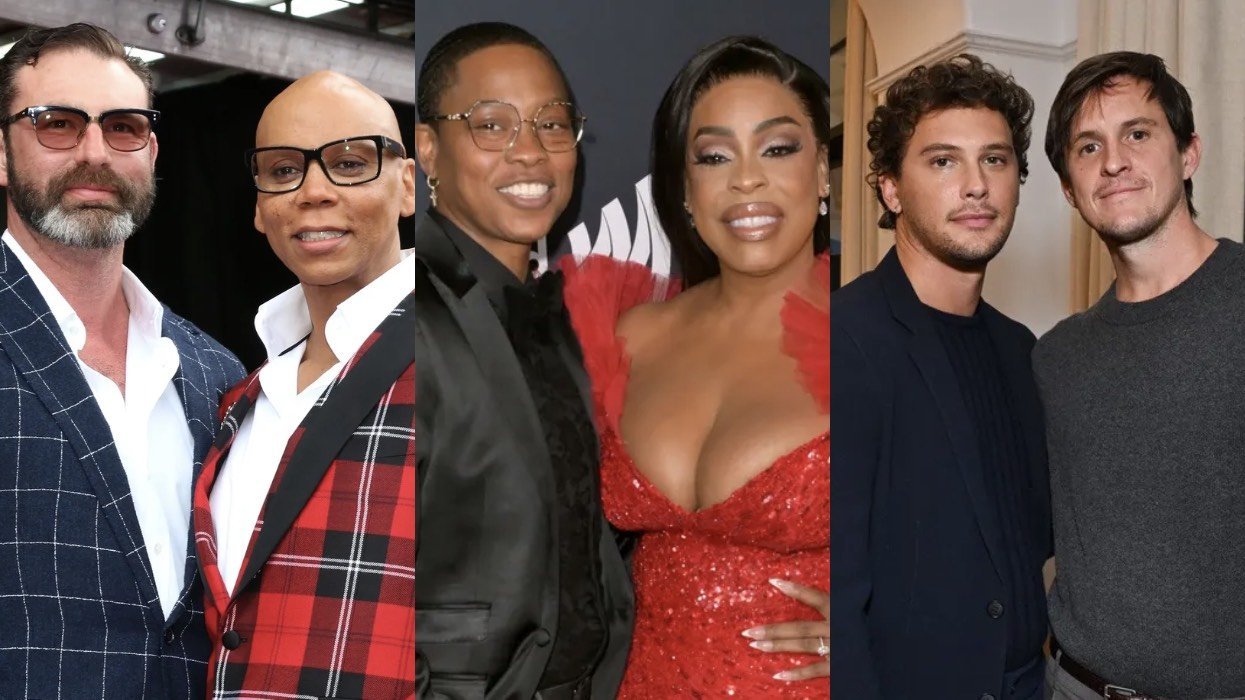For queer people, sex isn't just something to do when there's nothing good on TV. It's a reflection of our identity, a way to interact with our culture and community. In a community where the right to even have sex together has taken decades to win, it means that sexual issues hit all the harder.
If you've got a partner to keep you warm this cuffing season, congratulations! But what do you do if you and your partner seem to find yourselves consistently at sexual odds with one another?
We asked three experts — Tori Buckley, a Denver-based licensed professional counselor and LGBTQ+ mental health expert; Dr. Candice Nicole Hargons, award-winning psychologist, sexologist, and associate professor at Emory University's Rollins School of Public Health; and Sofie Roos, licensed sexologist, relationship therapist, and author at Passionerad — for their advice on how to figure out if you and your partner are sexually incompatible and what, if anything, you can do about it.
What does it mean to be "sexually incompatible" with someone?

Courtesy of Wongsakorn Napaeng/Shuttershock
Sexual incompatibility, as Buckley so aptly put it, "Occurs when partners have differing needs, desires, or approaches to sex that feel impossible to reconcile." Dr. Hargons describes it similarly, but adds an element of disconnect and frustration, saying, "Sexual incompatibility occurs when the desire, arousal, and preferences of sexual partners are so out of sync that both are unwilling to find common ground."
Buckley also explains that sometimes this incompatibility can stem from the different reasons why we have sex, "Some individuals are aroused by elaborate fantasies they’ve built up, while others experience sex as a purely physical activity, requiring little mental involvement. Others may see it as an expression of emotion or a way to play with energy. Some can only have sex once they feel emotionally connected, while others feel connected by having sex. Understanding these differences is a foundational step to dismantling the illusion of incompatibility
Roos includes other examples, situations like when "One’s into vanilla stuff and the other one gets going off more kinky stuff, but it can also be about how often you want to have sex or about what kind of sex that you enjoy (eg. one might love penetration and the other one being more into oral because they find penetration unpleasant)."
To help gauge the sexual health of your relationship, Buckley suggests Miss Jayia's Erotic Blueprint, a framework to help you evaluate your sexual experiences. The Erotic Blueprint, Buckley recounts, is broken up into five parts:
"Sensual: based in the five senses — think ambiance, food play, and a sexy playlist. Energetic: based in sexual tension — think teasing, goosebumps from anticipation, or fantasizing at work all day about later that night. Sexual: based in cultural norms — think dirty pictures, specific positions, and 'the money shot.' Kinky: based in the taboo, which varies by individual — think outdoor sex, fetishes, or power dynamics. Shapeshifter: requiring a mix of all the above to feel fully satisfied."
If you're worried you and a partner might be sexually incompatible, this should help give you a sense of direction. It's concise, clear, and measurable. But every relationship, no matter how healthy or horny, has dry spells or miscommunication. How do you gauge how serious it is?
How can I tell if we're sexually incompatible or just having bad sex?

Courtesy of Lightfield Studios/Shuttershock
"Many couples mistake sexual impasses for incompatibility when, in reality, they stem from alack of communication, curiosity, or presence," says Buckley. "'Bad sex' is often rooted in misunderstandings rather than irreconcilable differences. If you and your partner are open to feedback, willing to experiment, non-judgmental, and invested in learning about each other’s needs, your sexual connection can almost always improve." That's all great news! The bad news is, really being incompatible isn't as simple.
Buckley further explains, "True incompatibility is rarer and typically occurs when partners’ core needs or erotic interests are deeply misaligned and neither partner is willing or able to meet in the middle. For example, one partner’s most erotic desires might feel triggering or off-putting to the other. In such cases, mutual respect and non-judgment are crucial to avoid shame."
Roos puts it simply, "If you’re incompatible, you’re just not on the same page." So even if you're an open communicator with a curious attitude, sexual incompatibility is harder to deal with than simply having bad sex. "This means that if you're incompatible, you’re having different sexual needs to get satisfied, and this can be difficult to address since you often need to compromise and end up with none of you truly feeling fulfilled."
Hargons has an activity for you and your partner to do to help discern if you're compatible or not. In her upcoming book Good Sex: Stories, Science, and Strategies for Sexual Liberation, Hargons describes the "Yes, No, Maybe So" list. You might also be familiar with it as a "Want, Will, Won't" list. It's incredibly helpful, and very easy to do. All you need is a piece of paper and a writing utensil, or you can even just use the notes app on your phone.
"Create three columns or lists," instructs Hargons. From there, "In the Yes column/list, write all the sexual activities you have tried and like or things you really want to try. In the No column/list, write all the sexual activities you have tried and do not like or things you never want to try. In the Maybe So column/list, write all the sexual activities you have tried and may like or things you may want to try depending on the context. Then, share this list with the partner you are trying to see if you're compatible with. Consider how much you have in common vs. how much differs. You may have many things in common that you desire, but you just aren't acting on them yet or need to develop the skills."
Now that you know what you're really dealing with, you can start beginning to address it. And keep your Yes/No/Maybe So lists on hand!
What can I do sexually to try and fix it?

Courtesy of VladOrlov/Shuttershock
Because Hargons's advice was the most actionable for figuring out if you are incompatible, it's also the most straightforward for trying to fix it if you are. She advises you and your partner to, "Choose at least one thing that you both share on your 'yes' lists and make sure you prioritize doing that thing with each other. Communicate about how you like it, what good sex seasonings (like passion, kinkiness, love, or sensuality) you want to add to the specific sex acts to make it more fulfilling. Practice with each other."
Roos brings up the idea of trying out a sex game! "A sex game is likely to challenge your fixed ideas about sex, and both are likely to discover new things they like that you can meet in," she says. "For example, one who’s into rough sex might find really enjoyable ways of having calm sex, while one who’s experiencing a lower sex drive than their partner can find a spark through a door that opens via the sex game that makes them curious to keep discovering intimacy and sex together."
She adds that sex games might be especially impactful because they take what we generally consider to be a negative problem to be dealt with, and turns it into something to work through together creatively and playfully. "When talking about sexual incompatibility, we tend to stare at the things that differs instead of looking for what we have in common, and by changing that mindset, we’re likely to find new things that gets us closer, even though we still are as incompatible in the things we didn’t match in before.In other words: it can be difficult to solve the differences, and it is often much easier to create something new instead and let the differences be there, because there’s so many ways to have sex so you can always find things you both like and that gets you going!"
If games aren't your thing, Buckley suggests you should, "Start with open, judgment-free conversations about preferences, fantasies, and boundaries. Websites like Quivre and We Should Try It provide structured ways to explore sexual curiosities with your partner." These are all excellent tools, but addressing something on this scale requires a holistic approach.
What can I do outside of the bedroom to try and fix it?

Courtesy of Prostock-studio/Shuttershock
If you want your sexual relationship to improve, you're going to have to put the "cum" in "communication." Roos says to, "Communicate how you feel in a respectful way as well as saying what you’d like to change and how you can work on that together is the best start. Let your partner know that you don’t feel you’re on the same page and ask for their view of the situation as well."
Conversations like this can be emotional and complex on all sides, so Roos emphasizes, "It’s extremely important to maintain a respectful tone, because otherwise, the risk increases of you getting into a defense mode kind of discussion where you start blaming each other instead of working as a team. When trying to find each other and build that compatibility, it’s extremely important to be open minded, to hear your partner out and work together with the goal of getting more chemistry in bed, this without disregarding your own boundaries."
Do you still have your Yes/No/Maybe So list? Good, it's still an important tool here! "Be curious about what's on your 'no' or 'maybe so' lists, without judgment," says Hargons. "Ask what needs that sexual activity may fulfill for them, and then see if there are other options that may fulfill that need if you are not able or willing to add it to your Yes list. Remember, erotic equity doesn't mean doing exactly what your partner wants, and them doing the same for you. That's more like erotic entitlement. But, you can be creative about the approach you take to addressing their sexual desires."
If you're in a monogamous relationship struggling with sexual incompatibility, this might be an opportunity to explore non-monogamy, says Buckley. For some, exploring ethical non-monogamy (ENM) can provide an additional layer of connection and fulfillment. Opening a relationship ethically requires honest communication, clear boundaries, and ongoing reflection to ensure it strengthens rather than jeopardizes the bond between existing partners."
But ENM isn't one size fits all, nor is it one time solution, it's an ongoing practice that takes work like any other part of your relationship. Buckley warns, "When used to avoid addressing existing challenges, ENM is more likely to cast a spotlight on that issue and cause the original relationship to crumble. Healthy ENM requires care and attention to all relationships and people involved. That said, it can also offer opportunities to explore new aspects of your sexual identity with varied partners and often reinvigorates existing sexual connections."
If you've never struggled with sexual incompatibility, it's easy to skeptical, or even judgmental. But it can happen to you, too, even if it's something you and your partner had never dealt with before.
What can I do if this is a new problem in a not-so-new relationship?

Courtesy of Marc Roura/Shuttershock
Buckley describes the factors that might lead to sexual incompatibility arising as a new problem in a well established relationship. It can stem from a myriad of places, like, "When a previously fulfilling sexual connection shifts, external factors such as stress, grief, medication changes (e.g. hormones, antidepressants, blood pressure meds, etc), or body image challenges often play a role. Identifying and addressing any underlying factors can foster empathy and patience, as well as help you seek the right support."
Don't lose hope. Everything has an ebb and a flow, including relationships. Buckley also reassures us, "Relationships naturally evolve, and it’s normal for sexual dynamics to do the same. Rekindling intimacy often involves intentional efforts to reconnect, such as prioritizing date nights, flirting, or trying new activities together — in and out of the bedroom. Keeping your relationship on a low simmer, rather than letting it cool entirely, makes it easier to reignite passion."
Hargons says that this can be an opportunity for partners to take a moment and reflect; to look inward and try to see the root cause. She says to, "Take inventory on when things changed by relationship mapping. Talk about the key moments you noticed a difference, and then consider what was happening in your worlds around that time. Maybe you were grieving a loss or your bodies were changing. Maybe the things you used to like don't do it for you like they used to. It's okay to change and evolve, and sometimes we hold on to this past version of our partner instead of evolving with each other."
Roos brings up an especially good point, adding that you should "Ask yourself if the problem is new, or if you just have ignored it or not paid it any attention before. Many times, we tend to overlook sexual incompatibility if being newly in love, and when reality catches up — which can take months or years for some, so can still happen in a not new relationship — you see the situation more clearly and realize that 'Hey, we’re really not having same needs in bed.'"
So what do you do if you've taken stock, you've made the lists, you've played the games, and it's still not working? How do you know if this is a problem worth ending a relationship over?
How do I decide if this is big enough for us to break up?

Courtesy of Srdjan Randjelovic/Shuttershock
It's a big question. Ultimately, you're the only person who can make that decision for yourself, but our experts shared some of their most insightful advice yet, to help. Ultimately, this all comes down to your relationship with yourself, with your partner, and to sex as a part of your life.
Before ending a relationship over sexual incompatibility, Hargons recommends seeking professional help. "If you try some of these strategies and they don't work, the relationship may benefit from sex or relationship therapy," she says. "After giving it some time to work on it more intensely, it may be that the issue is more than you both want to handle. That's okay, not all relationships are meant to last. But, if the relationship is worth the work, there's incentive to at least try."
Roos says that, "If sex is a really big part of your life and that the incompatibility makes you feel unsatisfied or that one of the major points of being in a romantic relationship for you is the sex and it simply isn’t working, then it’s worth considering leaving." However, she reminds us that in if you're in a long term relationship, that often means that the payoff for all your hard work will be long term too. And yet, sometimes it's better to know when to say good-bye.
Roos says, "You need to feel that it’s worth the hassle of working for your pleasure with this partner though, because in some situations, you simply don’t feel it’s worth it and you rather go on finding someone where it just says click right away, so knowing when it’s time to leave is highly individual, but as a starter, ask yourself how much work you’re ready to put into solving this for making the relationship work, and when you get there, see the result and make a decision based on that."
Buckley emphasizes that sex is an important part of life and identity, and that it isn't trivial to end a relationship over sexual incompatibility. She says that, "Persistent resentment, shame, or disconnection stemming from unresolved sexual incompatibility may indicate a deeper misalignment. Relationships thrive on mutual respect, shared values, and a commitment to growth. If these foundations are intact, sexual challenges can often be navigated with effort and support. If not, it may be time to consider therapy or parting ways."
Ultimately, Buckley reminds us that queer people always have to fight harder for our relationships to thrive, but that that fighting is well worth it. "Sex is an ever-evolving aspect of relationships that thrives on communication, curiosity, and compassion," she says. "For LGBTQ+ individuals and couples, addressing these issues often involves unpacking societal and internalized oppression, making professional support especially valuable. No one should feel stuck or ashamed — pleasure and connection are worth pursuing!"
Experts cited:
Tori Buckley, a Denver-based licensed professional counselor and LGBTQ+ mental health;
Dr. Candice Nicole Hargons, award-winning psychologist, sexologist, and associate professor at the Emory University's Rollins School of Public Health;
Sofie Roos, licensed sexologist, relationship therapist, and author at Passionerad






































































































































